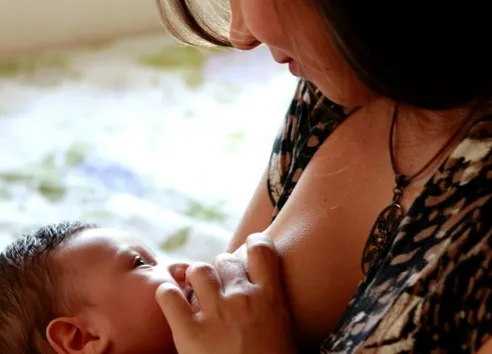Breastfeeding and breast cancer.
What is the link?

Can breastfeeding reduce your risk of breast cancer?
Yes, breastfeeding reduces your risk of breast cancer. The longer you breastfeed, the lower your risk. A large study found that breastfeeding could decrease the risk of breast cancer by 4.3% for every 12 months of breastfeeding.
This did not vary between high and low-income countries or with age, menopausal status, ethnic group, or age of the mother at first birth. Breastfeeding for more than one year reduces the risk of triple-negative breast cancer by around 20% and the risk in women with BRCA1 mutations by around 22-50%.
Tips to help with breast feeding.
Fueling your milk supply.
Have a well-balanced diet with extra fluids, which helps to produce milk.
Learn from trusted videos.
Watch breastfeeding tutorials on YouTube from trustworthy sources. For example, the NHS "Your Introduction to Breastfeeding".
Reach out for support.
Talk to your midwife about concerns, reach out to friends/family for support, and contact local breastfeeding groups or the National Breastfeeding Helpline (0300 100 0212).
Key facts about breastfeeding and breast cancer risk.
- Breastfeeding reduces breast cancer risk. The longer you breastfeed, the more your risk is reduced. The risk of breast cancer decreases by around 4% for every 12 months of breastfeeding.
- The UK has one of the lowest breastfeeding rates in the world. Around 72.7% of babies in England have breast milk after birth.
- Around 4.7% of breast cancer cases in the UK may be a result of not breastfeeding.
- The World Health Organisation (WHO) recommends exclusively breastfeeding for the first 6 months. Afterwards, children should be given complementary foods alongside breast milk.
What are the benefits of breastfeeding for infants and mothers?
Breastfeeding has many benefits for both you and your child. Babies who are breastfed have a reduced risk of death from infectious diseases, hospitalisation for diarrhoea, and fewer respiratory and ear infections.
Adults who were breastfed as children have a reduced risk of obesity and type 2 diabetes. Mothers who breastfeed have a reduced long-term risk of cardiovascular disease, diabetes, ovarian and breast cancer. A greater reduction of the risk is seen for longer periods of breastfeeding.
What is the current recommendation for the duration of breastfeeding?
The NHS and WHO recommend exclusively breastfeeding (breast milk only) for the first six months of the baby’s life. Breastfeeding alongside solid food is recommended for babies from six months on. A mother and baby can carry on breastfeeding for as long as they like, and this continues to offer health benefits.
Further reading
Download our free leaflet and flyer on breastfeeding.
Last review: Apr-24 | Next review: Apr-27.
-
- Stordal B. (2022). Breastfeeding reduces the risk of breast cancer: A call for action in high-income countries with low rates of breastfeeding. Cancer medicine, 10.1002/cam4.5288. Advance online publication. https://doi.org/10.1002/cam4.5288
- UNICEF. Breastfeeding in the UK. https://www.unicef.org.uk/babyfriendly/about/breastfeeding-in-the-uk/ (Accessed 08/11/2022)
- NHS. Infant Feeding Survey - UK, 2010. https://digital.nhs.uk/data-and-information/publications/statistical/infant-feeding-survey/infant-feeding-survey-uk-2010 (Accessed 08/11/2022)
- NHS. NHS Maternity Statistics, England - 2020-21. https://digital.nhs.uk/data-and-information/publications/statistical/nhs-maternity-statistics/2020-21 (Accessed 08/11/2022)
- NHS. Your breastfeeding questions answered. https://www.nhs.uk/conditions/baby/breastfeeding-and-bottle-feeding/breastfeeding/your-questions-answered/ (Accessed 08/11/2022)
- WHO. Exclusive breastfeeding for six months best for babies everywhere. https://www.who.int/news/item/15-01-2011-exclusive-breastfeeding-for-six-months-best-for-babies-everywhere (Accessed 08/11/2022)
